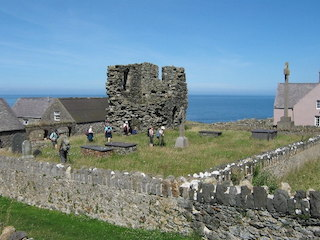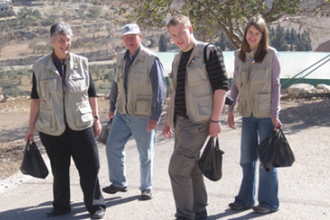Pilgrimage: The Road to Post-Secular Spirituality?

Graveyard and tower of St Mary's Abbey, Bardsey Island, Wiki Image by David Medcalf
Pilgrimage: The Road to North Wales is currently airing on BBC 2 and IPlayer. In a tried-and-tested format over six series, three hour-long episodes follow seven British celebrities from a variety of faith and cultural backgrounds as they traverse, on foot and by bus, the North Wales Pilgrims Way from Flint to Bardsey Island (Ynys Enlli). The premise behind the original series was to place individuals of different faiths in dialogue with one another during what is becoming an increasingly popular form of 'all faiths and none' leisure activity: a pilgrimage.
Bookended by significant holy places - St Winefride's Well in the east and the legendary 'Isle of 20,000 Saints' (Bardsey Island) in the west - the 220 km route taken by the celebrity pilgrims is unapologetically Christian-centred. In the BBC series, the path winds between ancient chapels and holy wells dedicated to early medieval saints. Along the way the pilgrims meet members of the local clergy, including the Bishop of Wrexham. Yet, despite this emphasis on Christian culture, this year's Pilgrimage seems to come with a message more pronounced than in previous series: 'You don't have to be religious to go on pilgrimage'.
This message is most strikingly brought out by the BBC's choice of cast members. Of the seven pilgrims participating in the programme only one is presented as a religious adherent, the Catholic Amanda Lovett. Most of her companions fall into the category 'spiritual but not religious': actor Tom Rosenthal, Springwatch presenter Michaela Strachan, former model Christine McGuinness, and Made in Chelsea star Spencer Matthews. The remaining two pilgrims are Eshaan Akbar, a lapsed Muslim, and Sonali Shah, described by the BBC as 'raised in a Jain household'.
Given that the Office for National Statistic provides a figure of 37.2% for those identifying as non-religious in the latest census, we might suppose that perhaps nearly three quarters of adults in England and Wales affiliate themselves with some kind of religion. This year's TV lineup is not, then, a very accurate representation of religious practice and belief in the UK. Cynics might even suggest that the BBC is promoting the idea that formal religion has largely been replaced by a culturally inclusive 'spirituality', which might be defined, in the words of Daisy Scalchi, BBC's Head of Religion and Ethics, as 'getting into the heart and soul of who we are and what makes life meaningful.'
Pilgrimage: The Road to North Wales, described by one journalist as, 'a spiritual hiking show', taps into this universalising understanding of modern-day spirituality, not least by adding a woodland Eco Retreat and a Buddhist meditation centre to the pilgrims' itinerary. The programme also reinforces the connection between contemporary spirituality and other western cultural trends and values, particularly the increasing demand for immersive tourism, the popularity of countryside walking to improve mental and physical health, and the allure of 'Celtic' Christianity as a humanist answer to existential questions.
As a researcher specializing in emerging pilgrimage trends and having myself taken part in many walking pilgrimages, I was intrigued to see how this year's series was received by the viewing public. Over a period of 48 hours during the Easter weekend, I analysed 108 social media comments posted by viewers on X (formerly Twitter). What I discovered was that the overwhelming majority of commentators had nothing but high praise for the programme.
There was a handful of individuals unhappy with the narrator's attempts to pronounce Welsh place names, but otherwise accolades such as 'brilliant', 'excellent', 'special', 'wonderful', and 'an unexpected treasure' abounded, with almost a tenth of reviewers on X proclaiming it 'the best series ever'.
What is it about the programme that inspired such acclamation, and prompted 12% of social media commentators to describe it as 'powerful' or 'moving'? As with its previous UK-based series, Road to the Scottish Isles (2022), the stunning rural landscape was a highlight for many, as was the group dynamics. However, a notable number of viewers were taken by the emotional journeys of self-discovery made by the pilgrims and by nature-related concepts of the divine: key aspects of contemporary spirituality. The idea of 'thin places' - popularized, if not invented, by the founder of the Iona Community, George MacLeod -especially seems to have especially struck a chord.
There was just one dissenting voice among the 108 comments on X. Despite acknowledging 'some heartwarming moments' in the current series, a Welsh Anglo-Catholic conceded she was 'left feeling frustrated and dissatisfied', particularly with the downplaying of Christianity. She went on to add, "I find the notion of 'spirituality', where detached from specific religious traditions, nebulous to the point of being meaningless."
Of course, it may be that other critics stayed away from social media, or avoided the series completely. However, judging by those who did voice an opinion on X over the course of 48 hours, pilgrimage is well on the road to becoming a religion-free zone in the imagination of the British public.
Sister Gill Price FC commented on X / Twitter:
"Could the fact that programme one aired on Good Friday account for the perceived lack of Christian engagement? I am watching it on catchup. Its a shame they did not mention Nodffa retreat centre as the place the pilgrims stayed at the start of programme two."


















